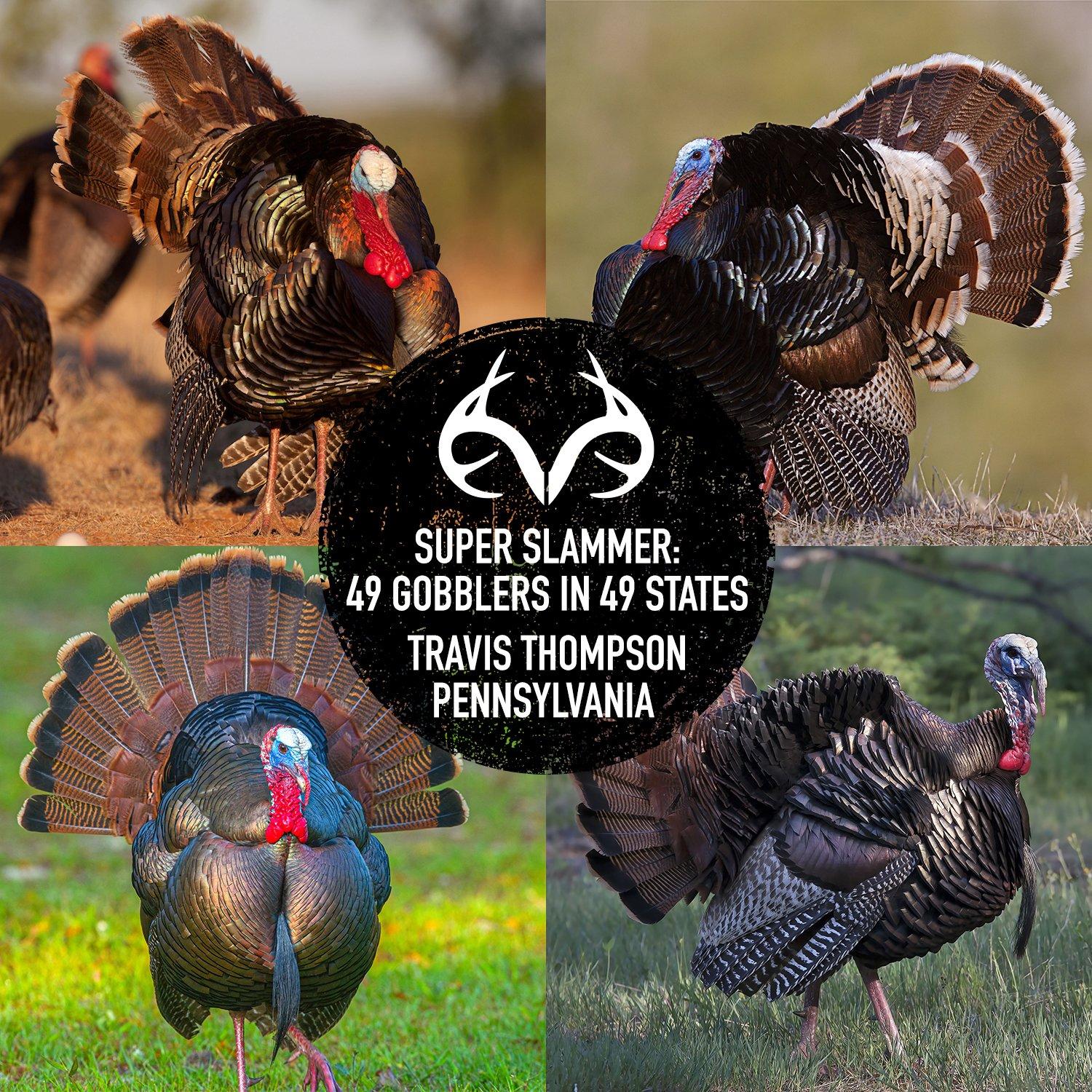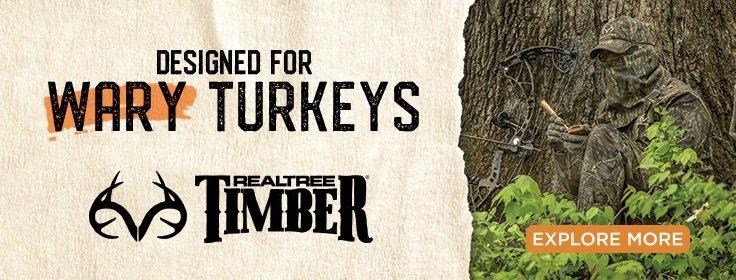Travis Thompson finished his wild turkey Super Slam by pulling the trigger on an Arkansas longbeard. Here's a look at what it takes to pull it off
Editor's Note: The U.S. Super Slam is taking a gobbler in all 49 states where they live (there are no turkeys in Alaska). Though the idea of it is growing in popularity, it's still a feat only a handful of hunters have been able to achieve. Earlier this month, we profiled Kentucky hunter Billy Barnett. This complementary story is about Pennsylvania hunter Travis Thompson. Both hunters recently completed the Super Slam.
When it came time for Travis Thompson to pull the trigger on his Arkansas gobbler - the last bird he needed to complete his U.S. Super Slam - he decided to make the experience last as long as possible.
As soon as I saw the fan come around the corner, I knew he was going to be mine. I also knew once I pulled the trigger, the whole journey that I'd been on for eight years would be over. So, I decided to take my time. I just sat back and admired him, and reflected on the good and bad experiences during my hunts through the years. I let him get super close, and almost past me, before I pulled the trigger. I just didn't want it to be over, Thompson said.
Once he realized he'd accomplished the Super Slam, Thompson called his parents, who've been very invested and supportive of his quest. My dad taught me how to hunt, he said. When I was 12 years old, I shot my first bird sitting between his legs. When I'm on the road, my parents, and especially my dad, call to check in. In fact, he's my first call when I harvest a bird or leave the woods.
Slamming Start
Thompson, who lives near Pittsburgh, Pennsylvania, said he didn't even know what the Super Slam was until he met renowned turkey hunter Clyde Neely in a turkey camp in Ohio.
"I have an area in the basement that I call my war room."
Learning he was from Kingwood, Texas, I asked him, 'what are you doing up here?' And he explained that Ohio was one of a few remaining states he needed to complete his Super Slam. I thought that was really neat, and in the back of my mind I knew it was something I wanted to do someday as well.
When he decided to actively pursue the Super Slam, Thompson, who works as a foreman in the oil and gas industry, knew he had limited vacation time and that it was going to take a lot of planning and logistics to make it all work.
I have an area in my basement that I call my war room, he said. There I kept a list of all the states I need to hunt to accomplish the Super Slam. I grouped them together and got on the fish and game websites for each state to see what dates each season opened. Since I hunt mostly public land, I wanted to try to hunt each state on opening weekend. So, I'd try to time it all out so I could do three or four states at a time, back-to-back, and not sit around waiting for an opening day.
(Don't Miss: What's Causing Poor Hatches of Turkey Poults?)
Thompson said many people don't realize how much planning must go into accomplishing a Super Slam, and for some states, like Delaware, Iowa, Wisconsin, and others, you have to draw to hunt public property.
Many states make December the deadline for the draw and if you forget or wait around, you're out of luck. You really have to plan ahead.
Thompson's Toughest Stops, and the Easy Ones Too
Thompson said no amount of planning prepared him for the challenges he'd face in some states.
Mississippi was by far the hardest state to hunt. Turkey season opens early in Mississippi, so a lot of people aching to get in the woods head there first, which means the turkeys get a lot of hunting pressure, he said. Plus, much of the good hunting land is taken up by leases.
He said Arkansas was also tough to hunt because of the low turkey population caused by poor hatches and too many predators. He said the easiest state for him to hunt was his home state of Pennsylvania.
As a foreman in the oil and gas industry, I run water lines and pipelines for hydraulic tracts, which can span five or six miles. Which means, I deal with a lot of landowners, he said. If I am on a piece of property with good turkey sign, I'll often ask permission to hunt it. I have many good spots to hunt in Pennsylvania, as well as West Virginia, thanks to my job.
Staying the Course
Thompson says no matter where he hunts, his tactics remain basically the same. Of course, sometimes a change in terrain or turkey behavior dictates a change in hunting style.
My hunting style pushes the limits.
Out in Arizona, the terrain is vast and the Merriam's gobble a lot more than the Easterns around here do. The birds that live near me only gobble in the morning, but Merriam's gobble through the day and into the evening, making them easier to spot, Thompson said.
He says his vest is often loaded down with a number of calls so he'll have the option to test out many different calls if a bird isn't responding. I have a glass and slate pot call and three or four box calls, but my favorite are my mouth calls. I feel like mouth calls allow me to do more and sound more realistic.
He says he doesn't care for fanning turkeys, and he rarely uses a decoy because he mostly hunts public land and he feels it's not safe. My hunting style pushes the limits, Thompson said. I'm very aggressive and try to get as close to the birds as I possibly can, while still being smart about it.
(Don't Miss: Slow Cooker Turkey Leg Noodle Soup)
When he does pull the trigger on a bird, he's relying on his trusty Benelli 12-guage Super Nova. He shoots Apex TSS No. 9s, which he says pattern best out of his gun.
Now that he's completed his Super Slam, Thompson said he's not done chasing toms. In fact, he'll continue to try to kill 15 to 25 birds a year. My dad and I are going to Mexico to hunt Gould's turkeys, Thompson said. I already have five or six Grand Slams. If I get a Gould's, I will have a Royal Slam. Next year, I plan to going to the Yucatan for Ocellated birds. And then I'll head on to Canada where I'll try for the Canadian Slam.
Thompson's Super Slam States in Order:
- 2014 - South Carolina, Maryland, Colorado, Wisconsin, Pennsylvania, Michigan
- 2015 - Hawaii, Texas, Tennessee, Kentucky, Oregon, Wisconsin, Pennsylvania
- 2016 - California, Virginia, Washington, Nebraska, Wisconsin, Pennsylvania, Minnesota, West Virginia
- 2017 - Georgia, Texas, Nebraska, West Virginia, Iowa, Pennsylvania, Indiana, New Hampshire, West Virginia
- 2018 - Texas, North Carolina, Idaho, Montana, West Virginia, New Jersey, Rhode Island, Pennsylvania, New York, West Virginia
- 2019 - Texas, Nevada, North Dakota, Illinois, West Virginia, Pennsylvania, Massachusetts, Vermont, Utah, Oregon
- 2020 - Louisianna, Texas, New Mexico, Maryland, Pennsylvania, West Virginia, Connecticut, New Hampshire, Oregon
- 2021 - MIssissippi, Texas, Delaware, Arizona, Arkansas, Michigan, Pennsylvania, South Dakota, Nebraska, West Virginia, Oregon









